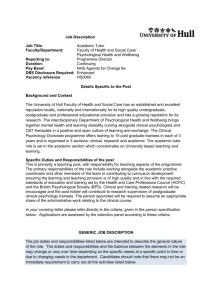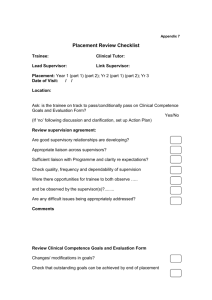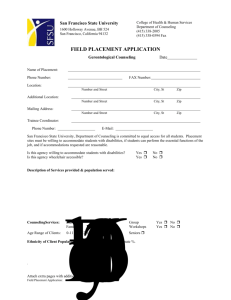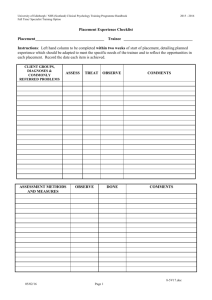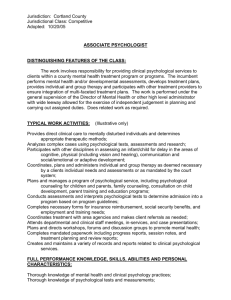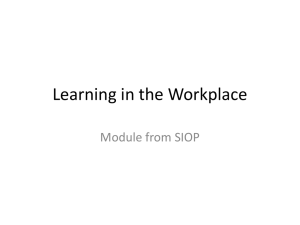herefordshire clinical psychology service
advertisement
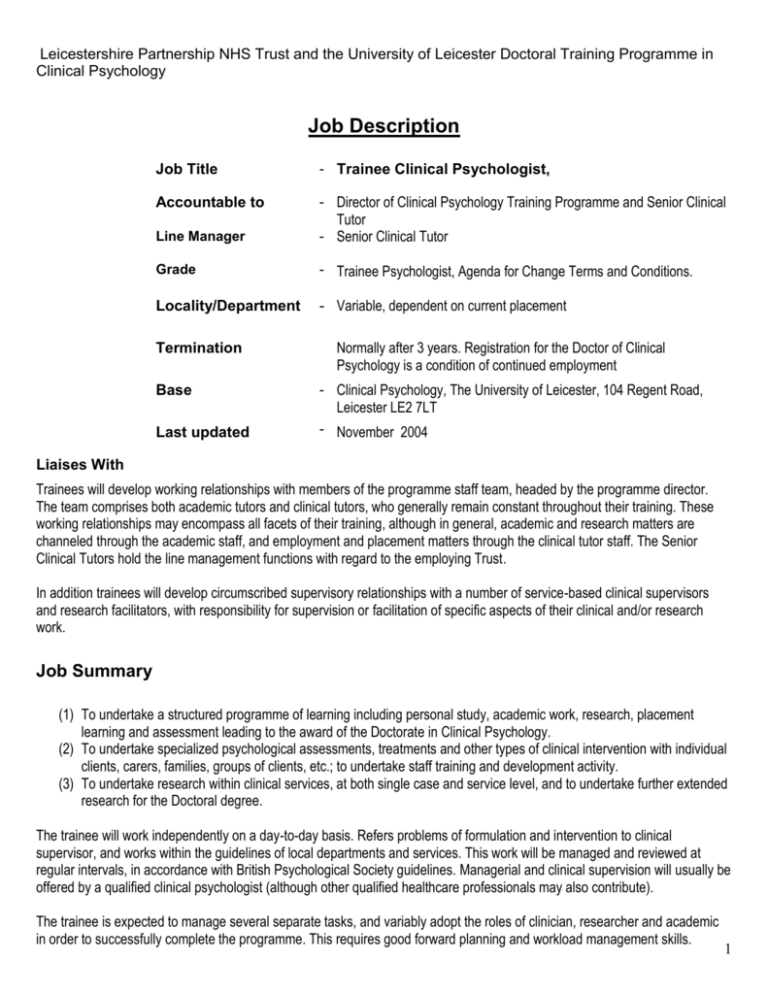
Leicestershire Partnership NHS Trust and the University of Leicester Doctoral Training Programme in Clinical Psychology Job Description Job Title - Trainee Clinical Psychologist, Accountable to - Director of Clinical Psychology Training Programme and Senior Clinical Line Manager Tutor - Senior Clinical Tutor Grade - Trainee Psychologist, Agenda for Change Terms and Conditions. Locality/Department - Variable, dependent on current placement Termination Normally after 3 years. Registration for the Doctor of Clinical Psychology is a condition of continued employment Base - Clinical Psychology, The University of Leicester, 104 Regent Road, Last updated - November 2004 Leicester LE2 7LT Liaises With Trainees will develop working relationships with members of the programme staff team, headed by the programme director. The team comprises both academic tutors and clinical tutors, who generally remain constant throughout their training. These working relationships may encompass all facets of their training, although in general, academic and research matters are channeled through the academic staff, and employment and placement matters through the clinical tutor staff. The Senior Clinical Tutors hold the line management functions with regard to the employing Trust. In addition trainees will develop circumscribed supervisory relationships with a number of service-based clinical supervisors and research facilitators, with responsibility for supervision or facilitation of specific aspects of their clinical and/or research work. Job Summary (1) To undertake a structured programme of learning including personal study, academic work, research, placement learning and assessment leading to the award of the Doctorate in Clinical Psychology. (2) To undertake specialized psychological assessments, treatments and other types of clinical intervention with individual clients, carers, families, groups of clients, etc.; to undertake staff training and development activity. (3) To undertake research within clinical services, at both single case and service level, and to undertake further extended research for the Doctoral degree. The trainee will work independently on a day-to-day basis. Refers problems of formulation and intervention to clinical supervisor, and works within the guidelines of local departments and services. This work will be managed and reviewed at regular intervals, in accordance with British Psychological Society guidelines. Managerial and clinical supervision will usually be offered by a qualified clinical psychologist (although other qualified healthcare professionals may also contribute). The trainee is expected to manage several separate tasks, and variably adopt the roles of clinician, researcher and academic in order to successfully complete the programme. This requires good forward planning and workload management skills. 1 The trainee brings to bear a greater level of knowledge, training and experience on clinical and research activity than the assistant psychologist. Working Environment The trainee may be required to travel to placements across a large geographical area. The trainee will be required to visit a range of settings on placement, including home visits. The trainee may be exposed to violence or threats of violence and will frequently be working in highly distressing situations with highly emotive material. Most face-to-face clinical work is sedentary. There is a requirement to sit for long periods of time in constrained positions during meetings and also to regularly spend time sitting at a computer. Another feature of the working environment for the trainee is a regular change of work placement. Over the three years, they will be expected to work in a number of different services and settings, and with a number of different client groups, eg, the elderly, children, adults with mental health difficulties and both children and adults with learning disability. Each new setting requires the building of new professional working relationships with staff teams. Key Result Area 1: Clinical 1. To undertake complex psychological assessments, using structured interviews, psychological assessments (including complex psychometric tests) and observations of individuals and groups. Carry these out sensitively and independently with a broad range of client groups. 2. To assist in the development of psychological formulations of clinical problems and the development and delivery of care plans, which include psychological treatment and/or management of clients’ problems. Formulates the nature, causes and maintaining factors of highly distressing psychological difficulties and presentations. 3. Uses a broad range of potentially conflicting clinical, theoretical and conceptual models, as well as the empirical, experimental and clinical literature base and the results of assessment to inform and develop formulations. Communicates such formulations professionally, sensitively and diplomatically, frequently in an emotive atmosphere, to clients, relatives, carers and other healthcare professionals relevant to the case. 4. To carry out psychological and psychometric tests, to develop interview and observation skills and to assess needs and eligibility for services. 5. To design, implement and modify as appropriate, bespoke formulation-driven psychological interventions with clients, carers, families, groups, etc. and to evaluate the impact of such intervention. Implementation requires empathy and sensitivity. 6. To communicate confidential and personal information concerning ability level and psychological needs, obtained through assessments and interventions, to referring agents and to the client themselves, who may have limited understanding and difficulties with acceptance, and where appropriate to relatives and carers. 7. Networks and consults with relevant external agencies such as social services, independent and voluntary sector, to facilitate and enable intervention at multiple levels. 8. To provide advice and clinically based supervision to carers about care and management of clients’ problems. 9. To assist in the coordination and running of therapeutic groups. 10. To provide emotional support for clients, their carers and families. 11. To keep appropriate records of work and inform referrers and relevant others through letters or reports. 12. To work as a member of a multidisciplinary team. 13. To follow a person-focused and evidence based approach. 2 14. To work in partnership with service users. 15. To work in accordance with National NHS and placement providers’ policies and regulations, as well as those of relevant professional bodies. 16. To work in a variety of settings including the client’s own home, in-patient, residential and day centre facilities. 17. The post holder will be required to work in a highly emotive atmosphere, frequently encountering highly distressing problems and circumstances and must maintain a high degree of professionalism at all times. 18. The post holder will be required to work in situations where there are barriers to acceptance and possible exposure to aggression. 19. Receives regular clinical supervision in accordance with BPS guidelines and criteria and University procedures. Key Result Area 2: Human Resources Professional 1. To follow and comment on the advice and policies of the placement provider. This will include knowledge, awareness of, and compliance with the legal framework relevant to the placement and client group. 2. To be familiar with and abide by confidentiality and information handling and storage guidelines of the placement provider and the university. 3. To participate in regular developmental reviews with the Programme Director, Senior Clinical Tutor or their representative, identifying professional development needs, training needs, agreeing objectives, and formulating a personal development plan. 4. To cooperate in the use of rooms, books, tests and other equipment needed to carry out duties. 5. To attend and participate in administrative and service planning meetings, as determined by the clinical supervisor(s) 6. To undertake any other duties as requested by the Programme Director, such as participation in trainee and staff selection procedures, or service on programme and national committees. 7. To participate in evaluation and monitoring of the University programme and associated placements as required by the health service commissioners, the university, the QAA and the BPS. 8. To practice and conduct themselves in accordance with the BPS, employing Trust and University codes of conduct. Clinical Supervision, Teaching and Training 1. In conjunction with clinical supervisor, clinical tutor, academic tutor and research supervisor, to plan and prioritize own workload to include; clinical caseload, research activity and academic study. 2. May plan and deliver formal training sessions on psychological aspects of health care to mixed groups of relatives, care staff and other professional staff. 3. May plan and provide formal and informal training to other psychologists, other professionals, and carers, including the presentation of complex and sometimes contentious psychological and research material. 4. May provide practical training and supervision to care staff with respect to planned interventions. 5. May assist with providing specialist training to other psychologists, trainees and assistants as appropriate. 6. May be required to demonstrate own duties to other graduate psychologists. 3 Key Result Area 3: Research and Development Activity 1. To plan, monitor and evaluate own work, using clinical outcomes assessments, small-scale research methodology and statistical procedures. 2. A major requirement of the job is to plan and undertake formal Doctoral research, as agreed with the University programme staff and field research facilitators. 3. Completion of all aspects of the programme leads to the award of a Doctorate in Clinical Psychology. Is required to disseminate findings from own Doctoral research, including journal publication and conference presentation. 4. To manage expenditure from a small research budget. 5. To develop an advanced knowledge base and practical skill in the design, implementation and statistical analysis of a wide variety of types of research, which could include quantitative and qualitative, single case, ‘small N’ and group comparison studies. 6. To plan and undertake clinical audits or service evaluations, using appropriate methodology and statistical procedures as appropriate, as agreed with the clinical supervisor(s). This is an important requirement to fulfil the doctoral level training. 7. May plan and undertake practice-based research using or developing validated questionnaires. 8. To attend formal teaching at the University and to use the knowledge gained through this to complement 9: 9. To enhance own knowledge of clinical psychology, specific client groups and types of psychological difficulty through reading, literature searches and personal study 10. Completes assessment and evaluation procedures as required by the University programme. 11. To comply with the requirements of research governance and evidence-based practice. Key Result Area 4: Information Technology 1. To maintain appropriate records of own work, in electronic and hard copy, in line with NHS and Social Care policies and professional guidelines. 2. To maintain relevant administrative systems of own work, electronic and hard copy, in line with relevant guidelines. 3. To submit statistical information, activity and quality data of own work as required by local placement, the University programme, regional, national bodies or NHS. 4. To word process material relevant to the Doctoral programme (such as essays, case studies, service- oriented research projects, clinical audits and the doctoral thesis), using suitable word processing and spreadsheet software. 5. To use information technology as appropriate, within direct clinical work, research and treatment interventions. 6. To undertake clerical functions requiring some familiarity with applied psychology, including literature searches, developing and maintaining training packs, information leaflets, inputting data and other tasks necessary for the efficient running of the service and/or training needs. 7. To undertake computerized literature searches using major clinical databases such as PsychInfo, Medline and Cochrane, to inform routine clinical work and as preparation for the design of major doctoral research and smaller scale placement-based projects 8. To develop competence in advanced statistical software (such as SPSS) for the analysis of clinical research and research data. 4 Most Challenging Part of the Job Throughout their clinical psychology training trainees will need to maintain accurate self-awareness about their current knowledge and skills and use this to determine their own learning needs. The generic nature of training is such that trainees will need to do this in multiple organizational and professional contexts and in respect of several client groups, in the context of continuous assessment of performance. The post-holder will be required to comply with all relevant policies and procedures issued by and on behalf of the Trust, including those relating to Health and Safety, Confidentiality, and Equal Opportunities. The post-holder will be required to comply with the regulations and requirements of the University. This Job Description is not an exhaustive list of duties and responsibilities. This Job Description may be subject to review and change by agreement with the post holder according to the training needs and requirements of the University programme and of local services. Since this post will involve working with and caring for vulnerable adults you will be required to consent to an enhanced disclosure (under the provisions of the Police Act 1997). The Trust will require you to give permission to carry out a disclosure 5
